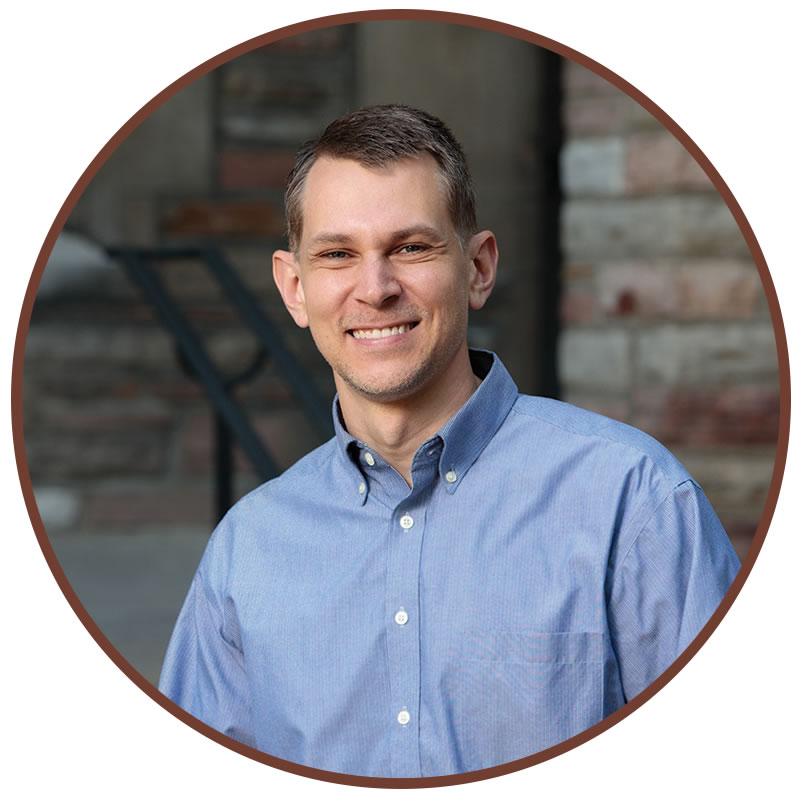
Concordia Seminary Newsroom
‘How do we catch people’: Seminarian longs to reach the lost

by Sarah Maney
“The path to Seminary has been a winding road,” says fourth-year Master of Divinity student Paul Dickerson.
In 2015, Paul was working as an attorney and investing time as congregation president at University Lutheran Chapel (ULC), located on the University of Michigan campus. His wife, Pamela, managed The Common Cup, a coffee shop and ministry of ULC. They were raising two kids. Their lives were busy to say the least.
But being a part of ministry offered the couple a feeling of purpose that they did not find anywhere else. The Dickersons loved how people from all walks of life converged at The Common Cup.
“I remember seeing three groups in the coffee shop,” Paul says. “One was a group of students talking about the human brain — studying neurophysiology. Another group was practicing conversational French. The third was having a Bible study. Here they were, together, having conversations side by side about faith and learning.”
For those who had never gone to church, the coffee shop was a welcome space. For those students who felt that their faith had to be hidden, they could comfortably meet for a Bible study or prayer.
“Years ago, the church used to be at the center of everything,” Paul says. “If you think of the culture as a river and the church was in the center of that river, we [the church] would catch people. But now, the church is sidelined. And that river is still flowing with people. So how do we reach them?”
That question proved to be a catalyst for Paul’s journey to becoming a seminarian and a future pastor.

Paul Dickerson. Photo: Jill Gray
In June 2016, Paul and his family moved into the married apartments on campus, affectionately known as “the Woods.”
He has appreciated how exegetical classes have taught him the right way to approach a biblical text. But the preaching and teaching classes have been the ones that he keeps “coming back to,” especially during his vicarage last year at Christ Memorial Lutheran Church in St. Louis, Mo.
“One of the key takeaways from my time on vicarage was that as a pastor, in some sense, you are always teaching. Whether in a sermon, a class or pastoral care, you’re always teaching ‘What does this mean?’ to a particular person or group of people,” Paul says. “It’s not the only way to approach it, but it seems like teaching is one of these lenses you can run almost everything through. One of the questions I’ve been asking a lot since coming back from vicarage is, ‘How would you teach that?’”
“For me listening means listening to the Word, listening to leaders, listening to people in the congregation.”
–Paul Dickerson
Paul’s vicarage supervisor, Rev. Jeff Cloeter or “Pastor Jeff,” senior pastor of Christ Memorial, explained to him that being a pastor requires four main tasks: listening, preaching, prayer and leadership. It was listening — in the broadest sense — that Paul would often revisit.
“For me listening means listening to the Word, listening to leaders, listening to people in the congregation — what are they talking about and going through, and listening to the broader culture — really working to pay attention to what God is saying in His Word, and what the Holy Spirit is saying through His church,” Paul says. “Where do those things meet up? Because that’s where you have a chance to speak the Gospel into a situation that’s meaningful.”
Paul still attends Christ Memorial and is finishing up his field work there this year, his last at the Seminary. Like the coffee shop at ULC, Paul appreciates the “mission platforms” that Christ Memorial offers to the public — a child care center and theater ministry and even a free fitness center, complete with personal trainers.
“We have to ask ‘how do we catch people?’ It’s this idea of having platforms that reach out into society that’s important,” he says. “It doesn’t mean that people are going to say yes when we reach out, but it does mean they’re having contact with you and even if they don’t show up every Sunday, I think in some way, many people have come to say, ‘That’s my church. That’s my pastor.’”
As his fourth year of pastoral formation comes to a close, he is considering his future call.
“I hope for a congregation that is willing to look out,” Paul says. “One of the rules of groups in general is that there’s this gravitational pull — to see only the people who are already here. You can’t get away from it.
“But being aware of it helps you structure your day and your ministries and what you emphasize to intentionally turn out and look and see — who are the others who aren’t here yet that need to be?”
Sarah Maney is a communications specialist at Concordia Seminary, St. Louis.